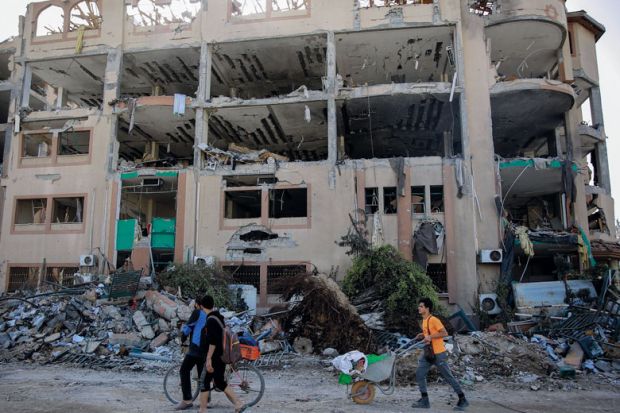Palestinian scholars mourn ‘deliberate targeting’ of higher education but pledge to rebuild once war is over

Israel has been accused of deliberately targeting universities and academics in Gaza as part of a strategy branded “educide”.
Following the controlled demolition of Al-Israa University, Israeli army footage of which was widely shared on social media, every single higher education institution in Gaza is believed to have either been destroyed or severely damaged since the invasion began.
Samia Al-Botmeh, an assistant professor of economics at Birzeit University in the West Bank, told Times Higher Education that the elaborate effort required to destroy large public buildings such as Al-Israa meant that it could only be part of an intentional plan to make Gaza “uninhabitable”.
“The destruction of the education sector is part of this overarching strategy of the destruction of every aspect of services in Gaza that make life there possible,” she said.
Recent figures from Euro-Med Human Rights Monitor indicate that Israeli military action has killed at least 94 university professors in Gaza since the country began its retaliation for Hamas’ 7 October attacks, as well as hundreds of lecturers and thousands of students.
The organisation claimed that Israel had “targeted academic, scientific, and intellectual figures in the Strip in deliberate and specific air raids on their homes without prior notice”.
Neve Gordon, an Israeli professor of human rights law at Queen Mary University of London, said “academia has been destroyed” in Gaza as part of an “educide”.
“The damage of three months will take 10 to 20 years to recover from,” said Professor Gordon, vice-president of the British Society for Middle East Studies.
Israel has defended the bombing of some universities by claiming that they were being used as training camps for Hamas, but Dr Al-Botmeh said education was being targeted because it was a “survival mechanism” for Palestinians.
“We see it as a mechanism of resistance, and, of course, Israel understands that, so is trying to undermine our capacity to survive, to resist, and our capacity to continue as a people,” she said.
Dr Al-Botmeh said the attacks went beyond Gaza, with staff and students from institutions in the West Bank being detained, and Palestinian students at Israeli universities being deregistered.
“This will make the process difficult in terms of rebuilding, but it will not stop us,” she said. “Peoples around the world are not broken by colonisers.”
Elham Kateeb, dean of scientific research at Al-Quds University, said all Palestinian universities in the West Bank were delivering education through distance learning and had tailored in-person teaching to address safety concerns on the roads and challenges at checkpoints.
“Despite the setbacks, universities can play a pivotal role in leading Palestinians towards their goals and state-building,” she said. “This commitment is embedded in their core missions of education, research and community service.
“Palestinian universities have historically been pioneers in shaping national identity, fostering resilience and contributing to community development. However, without a foundation of justice and freedom, this role becomes more challenging.”
Wesam Amer, dean of the Faculty of Communication and Languages at Gaza University, said the Palestinian academics who survived would be left facing severe trauma and psychological issues.
But Dr Amer, who has been evacuated to Germany with his family, admitted that it was difficult to think of higher education at a time when many scholars were focused on finding sustenance, shelter and safety for their loved ones.
“It’s not about academic life – of course, it’s very important, and it has been highly affected by the war – but I think we need a lot of support to rebuild,” he said. “The first aim is to end the war – today, not tomorrow.”
